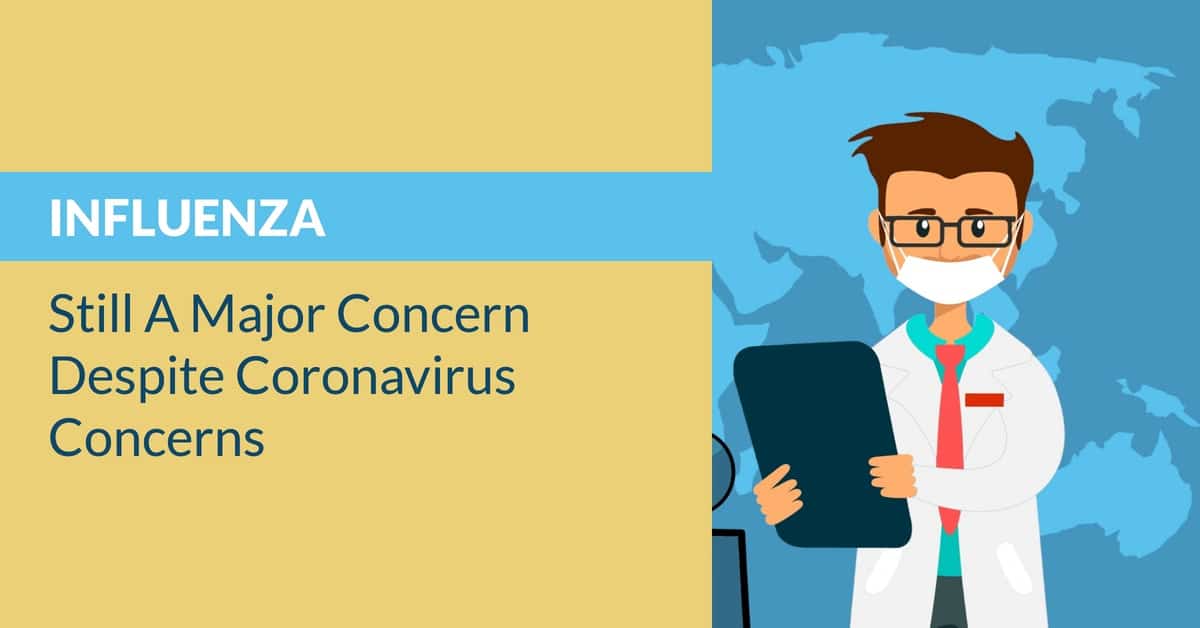Despite all the press and hysteria surrounding the novel coronavirus 2019-nCoV outbreak, influenza Type A and B outbreaks remain an ongoing and increasing threat across much of the United States.
Influenza Impact Far Exceeds Coronavirus
It seems that regardless of where you turn lately, there is post-apocalyptic news regarding the pending doom posed by the recent coronavirus outbreak in China.
According to the most up to date statistics, as of the time of this writing:
- 23,874 confirmed cases of coronavirus has been reported.
- 2,792, or 12% remain in critical condition.
- 492 people have died as a result of the infection, and;
- 876 have reportedly fully recovered.
It should be noted that the vast majority of these cases have occurred in China, with only 11 confirmed cases in the U.S., none of whom have died or remain in critical condition.
Source:
Conversely, as of the 25th of January, 2020, the influenza virus has;
- Impacted 19 million people.
- Killed approximately 10,000;
- Seventy of whom were children.
According to the U.S. Centers for Disease Control and Prevention;
The CDC’s weekly influenza surveillance report came out on Friday and showed that flu activity continued to climb for the second straight week.
Washington, D.C., Puerto Rico, and 41 of the 50 states all displayed high influenza-like activity through Jan. 25.
States from the Southwest to Southeast continue to be ravaged by the flu.
In fact, Florida is the only state in these regions that didn't report the highest level of influenza-like illness activity for the week.
Currently, likely due in part to a two-week reduction in outbreaks at the start of the year, the influenza outbreak is trending just below epidemic status.
According to the CDC;
Based on National Center for Health Statistics (NCHS) mortality surveillance data available on January 30, 2020, 6.7% of the deaths occurring during the week ending January 18, 2020 (week 3) were due to P&I.
This percentage is below the epidemic threshold of 7.2% for week 3.
Cleaning for Occupant Health
Regardless of which outbreak you're concerned with, at this stage, the most beneficial steps to take are:
- If you're ill, isolate yourself as much as possible and seek medical attention if it goes beyond a few days, or the symptoms become increasingly worse.
- If you're an employer, encourage your sick employees to stay home--allow them to work from home if they wish--but it is in your long-term financial interest to allow them a few days off to recover as opposed to dealing w/ the consequences of presenteeism and the ongoing spread of germs in your office.
- Wash your hands with soap and water, then use hand sanitizer in accordance with the CDC's 5 Step Handwashing Guidelines.
- Pay attention to what you touch when you are in public, especially your face, nose, eyes, and mouth--that is how influenza is most commonly spread.
- Increase disinfection practices throughout your facility, specifically germ hotspots.
- Upgrade your current facility cleaning practices to avoid the dangers of surface cross-contamination, the most common method for influenza and other germs to spread from room to room--second only to people spreading them by touch.
How to Wash Your Hands
The CDC advises a simple, 6-step handwashing practice that should take less than one minute to complete, but could save a life--even your own.
- Wet your hands with clean running water.
- Lather your hands with soap--make certain to get the backs of your hands, in between fingers, your nails, and your thumbs.
- Scrub for a minimum of twenty seconds.
- Rinse your hands with clean running water.
- Dry your hands with a clean paper towel.
- Apply hand sanitizer after exiting the restroom, allowing the solution to air dry as opposed to rubbing it until it dries.
Source:
Follow this practice after using the restroom, coughing or sneezing into your hand, or coming into contact with an individual or surface you believe may be contaminated.
Additionally, follow these guidelines before you eat or take care of children or the elderly when you are ill.
Takeaway
Much can be said of the recent media coverage of the coronavirus while ignoring the devastation influenza has caused in the U.S.-- little of it constructive.
What matters now is taking positive actions that result in improved individual and facility health for everyone, especially young children and students.
Accomplishing this task will require the efforts of skilled, dedicated, and well-equipped service providers.
Outsourcing is a proven method for acquiring the services of these trained professionals while maintaining costs and managing overhead.
Contact us today and discover why Vanguard Cleaning Systems® is the Standard of Clean® for businesses throughout Northwest Arkansas, Missouri, and Oklahoma.
In Oklahoma, dial 918-960-4450
In Arkansas, dial 479-717-2410
In Missouri, dial 417-812-9777

